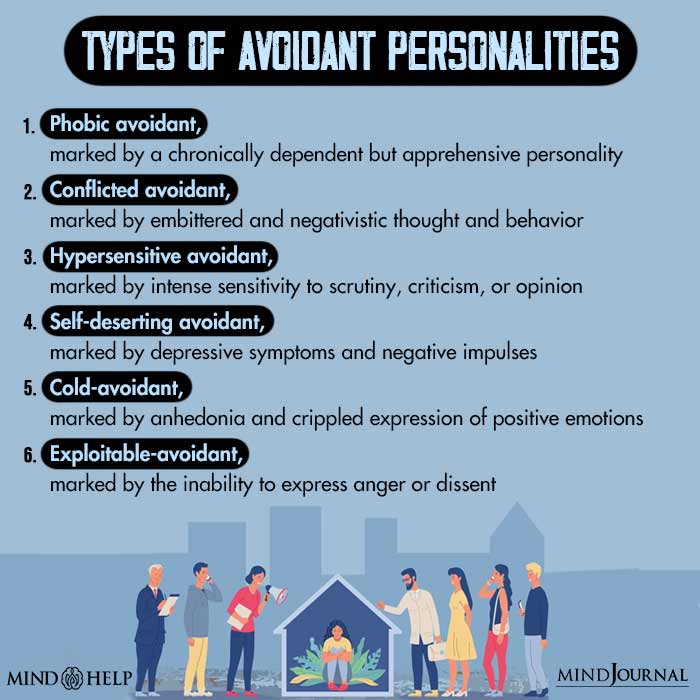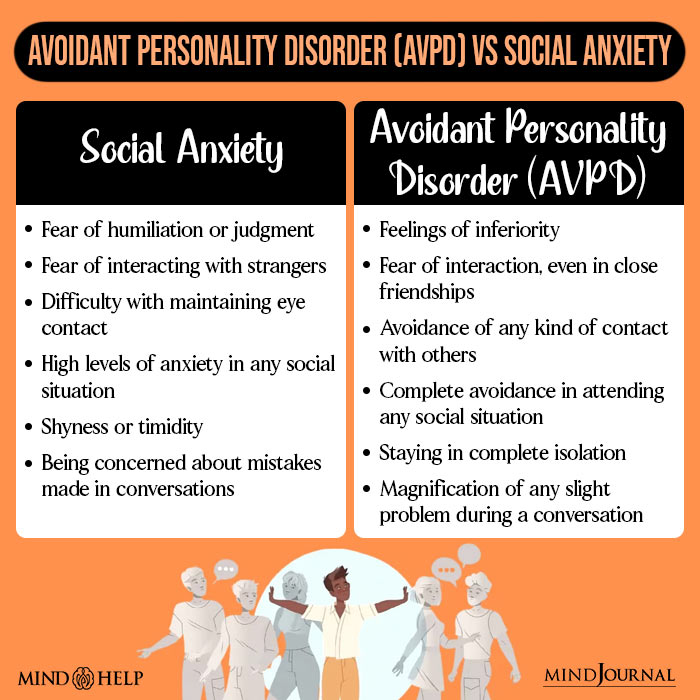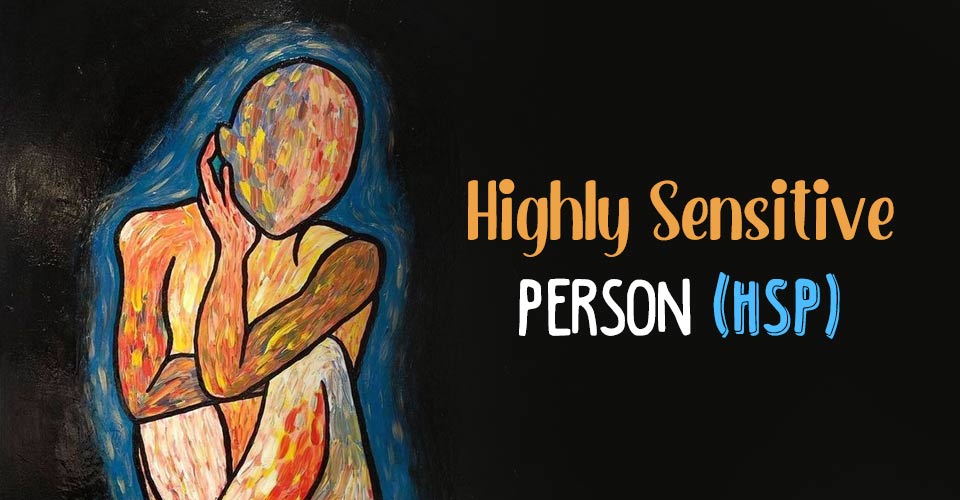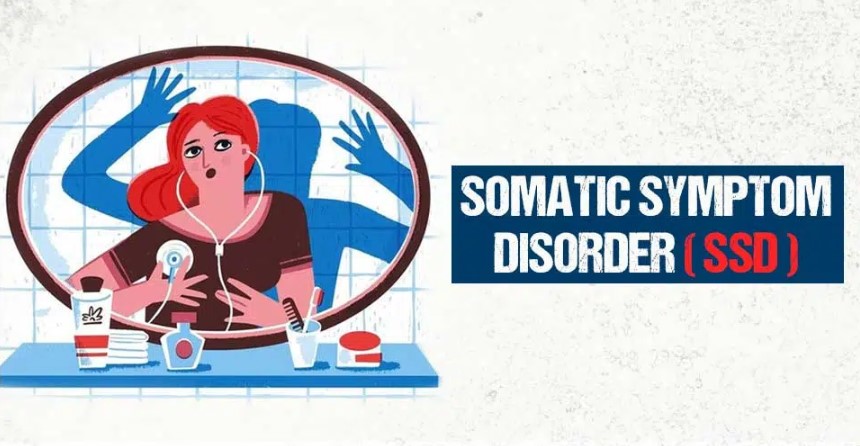Table of Contents
Avoidant personality disorder is a psychological condition marked by chronic feelings of inadequacy, fear of rejection or criticism, and excessive social withdrawal.
What Is Avoidant Personality Disorder?
Avoidant personality disorder (AvPD) is a mental health condition in which a person develops maladaptive patterns of response characterized by profound social anxiety, fear of intimacy, severe feelings of inferiority, and extreme self-imposed social isolation. This disorder has been recognized as a Cluster C personality disorder [mfn] Lampe, L., & Malhi, G. S. (2018). Avoidant personality disorder: current insights. Psychology research and behavior management, 11, 55–66. https://doi.org/10.2147/PRBM.S121073 [/mfn] in the Diagnostic and Statistical Manual of Mental Disorders (DSM-5).
People with AvPD suffer from the extreme fear of criticism, rejection, dislike, and humiliation. In social situations or work situations, they are overcome with shyness. They also develop an extreme sensitivity towards negative perceptions.
Apart from that, they also consider themselves to be socially unappealing and inferior and this triggers their fear of being rejected by peer groups or friends.
Often, they become hesitant to communicate with others and show a pattern of avoidance. Their imagined fear of social rejection and inadequacy results in significant distress or impairment in occupational, social, or other areas of functioning.

Prevalence Of Avoidant Personality Disorder (AvPD)
Avoidant personality disorder affects 2.1–2.6% of the adult population worldwide and has a lifetime prevalence rate of 9.3% [mfn] Reich, J., & Schatzberg, A. (2021). Prevalence, Factor Structure, and Heritability of Avoidant Personality Disorder. The Journal of nervous and mental disease, 209(10), 764–772. https://doi.org/10.1097/NMD.0000000000001378 [/mfn]. It appears to occur with equal frequency in males and females [mfn] Ortigo, K. M., & Blagov, P. (2017). Avoidant Personality Disorder and Gender. SAGE Knowledge; SAGE Publications, Inc. Available from: https://sk.sagepub.com/reference/the-sage-encyclopedia-of-psychology-and-gender/i2548.xml [/mfn].
The onset of AvPD typically occurs in late childhood or early adolescence. As individuals mature, some may no longer meet the criteria for the diagnosis. However, interpersonal symptoms may persist and continue to have a negative impact on functioning.
Case Example
Sunita has recently joined a college to pursue a postgraduate degree. From the very first day, she has remained shy and withdrawn, avoiding interaction with classmates and teachers alike. She fears that she may be rejected and criticized by others.
She stays aloof and maintains minimal-to-none social contact with others. Recently, she has also rejected a classmate who has asked her out on a date. Moreover, she does not participate in college activities like cultural programs and clubs.
Even in family get-togethers or other intimate celebrations, she does not participate out of fear for rejection and feelings of low self-worth. Her behavior has affected not only her time in college but also her close relationships in her family and friends circles.
Case Analysis
It has been evident from the aforementioned case that Sunita has a tendency to be significantly avoidant in social situations because of the fear of rejection, disapproval, and criticism.
It can also be seen from her current behavior that she typically avoids public gatherings or social participation due to feelings of inadequacy, poor self-esteem, and preoccupation with rejection.
She also inhibits herself from forging intimate relationships because she feels that she is personally unappealing and inferior to others in society. All of her behavior reflects significant signs of avoidant personality disorder (AvPD).
Symptoms Of Avoidant Personality Disorder
The common avoidant personality disorder symptoms include:
- Extreme shyness or anxiety
- Pathological self-loathing
- Extreme preoccupation with one’s shortcomings and weaknesses
- Vigilant for signs of disapproval or rejection
- Phobia of loss and social rejection
- Avoidance of public spaces for fear of embarrassment
- People-pleasing tendencies
- Fantasization of idealized and extremely unrealistic affectionate relationships
- Frequent and persistent feelings of uneasiness, loneliness, and isolation
- Heightened attachment-related anxiety and fear of abandonment
- Extreme hypersensitivity to negative evaluation
- Frequent misinterpretation of neutral situations as negative and unpleasant events.
Read More About Embarrassment Here
Comorbidities associated with AvPD
A person living with avoidant personality disorder may also display the symptoms [mfn] Lampe, L., & Malhi, G. S. (2018). Avoidant personality disorder: current insights. Psychology research and behavior management, 11, 55–66. https://doi.org/10.2147/PRBM.S121073 [/mfn] of:
- Anxiety disorders [Read more]
- Panic disorders [Read more]
- Agoraphobia [Read more]
- Obsessive-compulsive disorder [Read more]
- Schizophrenia [mfn] Fogelson, D. L., Nuechterlein, K. H., Asarnow, R. A., Payne, D. L., Subotnik, K. L., Jacobson, K. C., Neale, M. C., & Kendler, K. S. (2007). Avoidant personality disorder is a separable schizophrenia-spectrum personality disorder even when controlling for the presence of paranoid and schizotypal personality disorders The UCLA family study. Schizophrenia research, 91(1-3), 192–199. https://doi.org/10.1016/j.schres.2006.12.023 [/mfn] [Read more]
- Post-traumatic stress disorder (PTSD) [Read more]
- Dependent personality disorder [Read more]
- Self-harm [Read more]
- Depression [Read more]
- Substance use disorders

Causes Of Avoidant Personality Disorder
Research [mfn] Eikenaes, I., Pedersen, G., & Wilberg, T. (2016). Attachment styles in patients with avoidant personality disorder compared with social phobia. Psychology and psychotherapy, 89(3), 245–260. https://doi.org/10.1111/papt.12075 [/mfn] attributes the common causes of avoidant personality disorder to:
- Childhood emotional neglect
- A history of parental abuse and neglect
- Experiences of bullying and peer group rejection
- Scathing experiences of criticism and ridicule
- A family history of mental illness (such as personality disorders, anxiety disorders, depression, etc.)
- A genetic predisposition towards AvPD
Read More About Depression Here
Impact Of Avoidant Personality Disorder
Avoidant personality disorder, if left untreated, can contribute to several psychological and social complications. In children, it can enhance shyness, fear of strangers, social awkwardness, and sensitivity to criticism.
Even though such characteristics are a usual part of child and adolescent development, when added to AvPD, their daily functioning is impaired.
In adults, AvPD leads to social isolation and conflict in both their personal and professional lives. The sufferer avoids occupational activities that involve significant interpersonal contact. He/she also tends to be reluctant in taking personal risks or engaging in any new activities because these may prove embarrassing.
Avoidant personality disorder in relationships
Living with and loving someone suffering from AvPD can be highly challenging. People with AvPD find it extremely difficult to open up to emotional vulnerabilities, companionships, and friendships.
Their fear of rejection or judgment in intimate relationships makes them restrained and inhibited in interpersonal situations. They often question trust, commitment, and loyalty. They have a hard time expressing their emotions and handling criticism (even positive feedback from their romantic partners).
Such dysfunctional thought and behavior patterns contribute to shallow, unfulfilling, and unsuccessful relationships. This further makes them feel alone, isolated, and misunderstood. They become more self-conscious and self-critical of their flaws and develop symptoms of depression, stress, etc.
Moreover, the romantic partners of people suffering from AvPD may also feel neglected, helpless, and frustrated. In most cases, they feel underappreciated, socially unfulfilled, and conflicted in their relationships. This negatively impacts the quality and level of emotional intimacy in a romantic relationship.
Read More About Relationships Here
Avoidant Personality Disorder Diagnosis
A mental health professional can help to diagnose this disorder based on the diagnostic criteria laid down by the DSM 5. A doctor will first perform a physical examination to ensure that there are no underlying physical conditions that are triggering the symptoms. After a physical evaluation, the doctor will recommend a psychiatrist or mental health professional.
Treatment For Avoidant Personality Disorder
The common [mfn] Lampe, L., & Malhi, G. S. (2018). Avoidant personality disorder: current insights. Psychology research and behavior management, 11, 55–66. https://doi.org/10.2147/PRBM.S121073 [/mfn] avoidant personality disorder treatment methods [mfn] Sørensen, K. D., Wilberg, T., Berthelsen, E., & Råbu, M. (2019). Lived Experience of Treatment for Avoidant Personality Disorder: Searching for Courage to Be. Frontiers in psychology, 10, 2879. https://doi.org/10.3389/fpsyg.2019.02879 [/mfn] include:
1. Psychodynamic psychotherapy
This therapy is a form of talk therapy. Psychodynamic psychotherapy helps the patient to understand how their past experiences drive their current behavior.
This ultimately allows the patient to make peace with the emotional pains and conflicts of the past in order to move forward with a healthier outlook toward life. Both outpatient and residential treatment programs can both be effective against avoidant personality disorder.
2. Cognitive-behavioral therapy
This therapy involves helping the patient to evaluate and understand the negative thoughts and patterns that trigger unwanted behavior. The negative thoughts and patterns are altered with positive ones to derive a positive outcome. This therapy also helps to develop coping strategies to manage the symptoms.
Read More About CBT Here
3. Schema therapy
This therapy is an advanced form of cognitive behavioral therapy. The key feature of this therapy is “limited reparenting” which allows the patient to express their childhood needs and learn how to develop and internalize a healthy parent voice.
4. Pharmacotherapy
Pharmacotherapy is generally not thought to be effective in avoidant personality disorder. However, clinical recommendations exist for using pharmacotherapeutic approaches [mfn] Deltito, J. A., & Stam, M. (1989). Psychopharmacological treatment of avoidant personality disorder. Comprehensive psychiatry, 30(6), 498–504. https://doi.org/10.1016/0010-440x(89)90079-5 [/mfn] in Avoidant personality disorder treatment.
For instance, antidepressants or anti-anxiety medication [mfn] Ripoll, L. H., Triebwasser, J., & Siever, L. J. (2011). Evidence-based pharmacotherapy for personality disorders. The international journal of neuropsychopharmacology, 14(9), 1257–1288. https://doi.org/10.1017/S1461145711000071 [/mfn] can be helpful in improving moods, decreasing anxiety symptoms, and reducing sensitivity toward rejection in people trying to recover from avoidant personality disorder.
Coping With Avoidant Personality Disorder
Many people with avoidant personality disorder may become isolated, and this can significantly impact their physical and emotional wellness. Professional support can help people with AvPD cope with these difficult feelings and social challenges.
However, certain complementary treatment options and self-care practices [mfn] Lampe, L., & Malhi, G. S. (2018). Avoidant personality disorder: current insights. Psychology research and behavior management, 11, 55–66. https://doi.org/10.2147/PRBM.S121073 [/mfn] can help sufferers manage their symptoms and avoid their turning to harmful coping mechanisms like alcohol or drugs, smoking, overeating, or self-harm.
Consider the following measures for coping with avoidant personality disorder:
- Practicing mindfulness techniques
- Practicing meditation and yoga
- Engaging in healthy habits like journaling, participating in art sessions, etc.
- Having a regular sleep schedule
- Eating a healthy diet
- Availing treatment options like biofeedback, acupuncture, art therapy, etc.
How To Love Someone With Avoidant Personality Disorder
Sustaining a romantic relationship with someone with avoidant personality disorder may be challenging. Consider the following measures [mfn] Sørensen, K. D., Wilberg, T., Berthelsen, E., & Råbu, M. (2019). Lived Experience of Treatment for Avoidant Personality Disorder: Searching for Courage to Be. Frontiers in psychology, 10, 2879. https://doi.org/10.3389/fpsyg.2019.02879 [/mfn] for a more fulfilling interpersonal relationship:
- Understand that the affected person is extremely self-reliant and reclusive.
- Proceed with tiny attempts when it comes to showing vulnerability and communicating thoughts and feelings.
- Respect their boundaries and personal space.
- Lend a patient ear to their struggles and communicate openly.
- Allow them to open up. Empower them with validation, emotional warmth, and empathy.
- Create opportunities for an easy time for bonding or socializing with friends and family.
- Plan small-scale enjoyable leisure activities like hiking, art sessions, etc.
- If needed, help them avail therapy and support them through the recovery process.
- Help them develop healthy self-help coping strategies to operate comfortably in social situations.
Takeaway
AvPD is an important clinical issue prevalent in the community, with high rates of morbidity and heritability. Its timely and proper evaluation and treatment are mandatory for better patient outcomes. It is also essential to remember that the path of recovery and personal care isn’t a straight line, so don’t let discouragement take over when you struggle.
At A Glance
- Avoidant personality disorder is the chronic fear of social rejection and withdrawal.
- It affects 2.1–2.6% of the adult population worldwide.
- It can be highly crippling to the affected person’s social, personal, and professional lives.
- It can be treated with a wide range of therapies and medication.
- Developing healthy coping strategies is also considered effective during recovery.
Frequently Asked Questions (FAQs)
1. Who are some famous people with avoidant personality disorder?
Whoopi Goldberg, Donny Osmond, Kim Basinger, and Michael Jackson are a handful of public personalities with an avoidant personality disorder.
2. Who is at risk of avoidant personality disorder?
A person with a family history of depression, anxiety, or personality disorders is at a greater risk of developing avoidant personality disorder.
3. How can we help a child with avoidant personality disorder?
Helping the child avail therapy and supporting him/her through the recovery process can go a long way in aiding his/her struggle with avoidant personality disorder.
4. Can you have both dependent and avoidant personality disorders?
People who are diagnosed with a personality disorder most often qualify for more than one diagnosis. Therefore, it is possible for a person to have both dependent and avoidant personality disorders.
5. How do you self-treat avoidant personality disorder?
Availing therapy and/or medications comprises the best way to treat avoidant personality disorder. However, a person can manage the symptoms with complementary treatment options like meditation, yoga, biofeedback, etc.










Leave a Reply